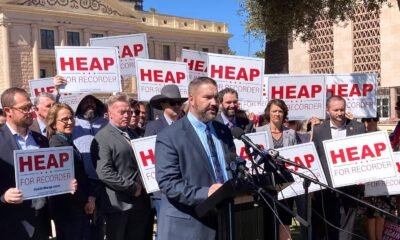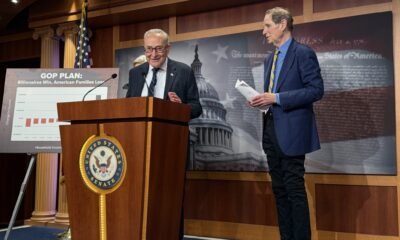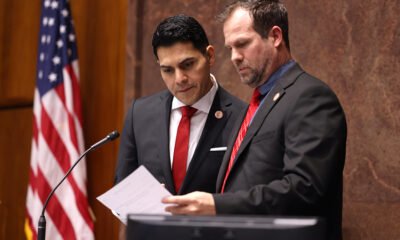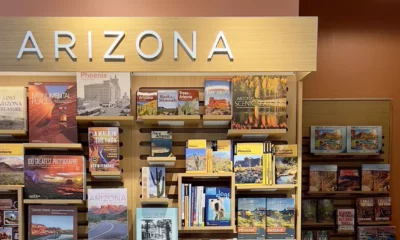border
Western Pima County House & Senate Candidates Clash Over Housing, Education, and Policy Issues
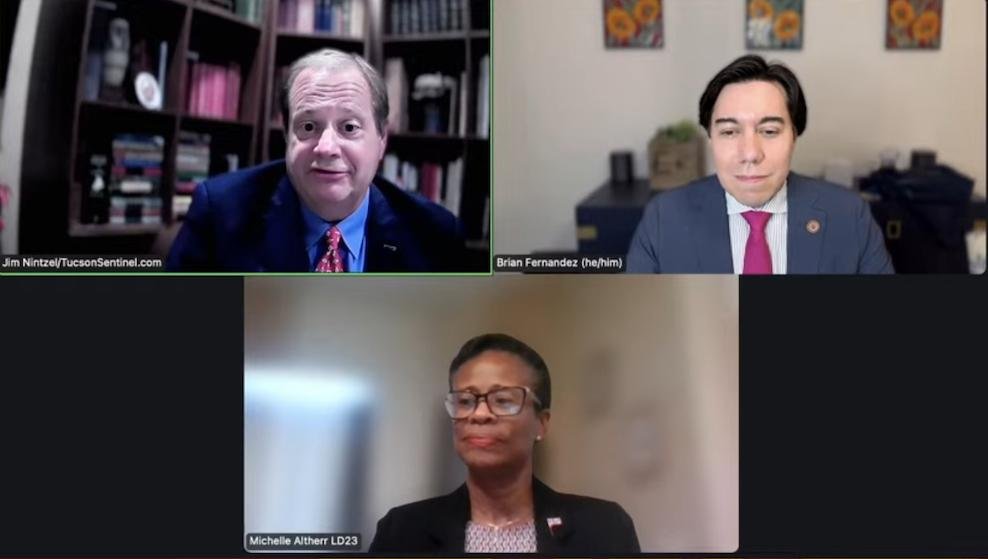
State Senator Brian Fernandez engaged in a heated online debate with Republican challenger Michelle Altherr on key issues affecting Arizona, including education funding, water use, and immigration policy. The debate, moderated by Tucson Sentinel reporter Jim Nintzel, showcased stark contrasts between the two candidates.
Altherr, a 15-year Air Force veteran, emphasized her mission to inject her values into the Legislature. While she expressed reservations about certain policies, she underscored her aim to “bring God back into the Legislature.” Recently transitioned to a career in fashion design, Altherr claims her military background equips her for true representation in government.
Claiming to fight a battle of good versus evil, Altherr raised questions about the legitimacy of the 2020 and 2022 elections. As the GOP chair of Legislative District 23, she referred to her participation in the controversial 2020 election audit, which had suggested minor discrepancies in vote totals between Biden and Trump.
Fernandez, representing the Democratic Party, highlighted his legislative accomplishments, including securing funds for critical local projects, such as Highway 95 and Arizona Western College. Returning to the Senate, he aims to safeguard voting rights and promote early voting.
After being appointed to the Legislature in 2021 following his mother’s resignation, Fernandez has positioned himself as a bipartisan collaborator, advocating for a nonpartisan approach to improving Arizona’s conditions.
Voter demographics in LD23 indicate a diverse electorate, with 47 percent located in Yuma County and 19 percent in southwestern Pima County. Notably, 41 percent of voters identify as independents, lending potential volatility to election outcomes. The district is currently represented by both a Democrat and a Republican in the House.
Altherr’s absence from a recent discussion among House candidates further underscored the diverging platforms on pressing issues like education, immigration, and infrastructure. In the upcoming Nov. 5 election, Democrats are poised to intensify efforts to seize control of the Arizona House, which currently leans Republican.
The debate also touched on educational funding, with Fernandez advocating for increased investments to improve learning environments. Altherr countered by arguing that the focus should shift from financial inputs to administrative efficiency, claiming mismanagement is the primary issue in schools. Both candidates echoed concerns about underfunded educational needs while clashing on the approach to reform.
Discussions about school safety extended to the contentious issue of gun policies. Altherr suggested arming teachers as a deterrent against violence, while Fernandez articulated his discomfort with introducing more firearms into schools, advocating instead for a safe learning environment devoid of fear.
Environmental matters were similarly contentious. Water management discussions revealed Altherr’s skepticism towards climate change claims, contrasting sharply with Fernandez’s push for innovative water conservation strategies. Both candidates acknowledged housing shortages but differed on how local governance should influence development.
The conversation about abortion rights highlighted Altherr’s staunch opposition, grounded in her religious beliefs. Fernandez, in contrast, advocated for reproductive rights, emphasizing personal choice and medical discretion. The debate reflects deep ideological divides between the candidates.
Additionally, immigration policy elicited contrasting perspectives. Fernandez denounced Prop. 314 as an unfunded mandate, while Altherr echoed concerns regarding border security, reflecting themes from previous Republican stances.
In the absence of Republican candidate Michele Peña during a discussion focused on House issues, Democrats Mariana Sandoval and Matias Rosales discussed the critical state of education and healthcare in Arizona. Both underscored a need for expanded access and support while expressing hopes for future legislative changes.
The discussions resonate deeply with the electorate, indicating that local policies will significantly impact the community’s future. With the elections on the horizon, these dialogues may shape voter turnout and influence the political landscape in Arizona significantly.
